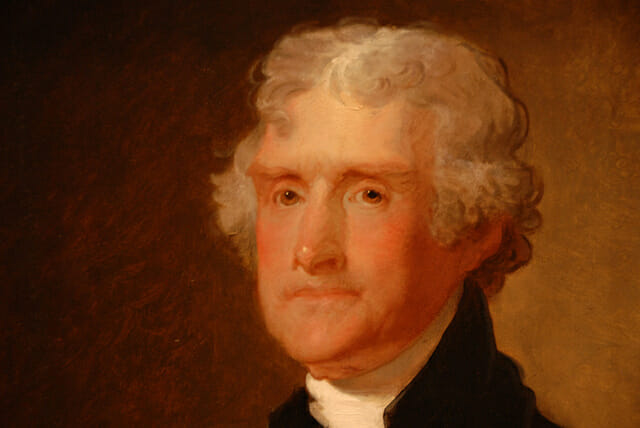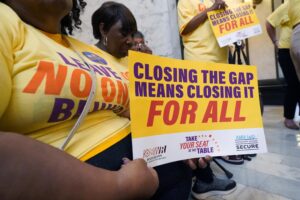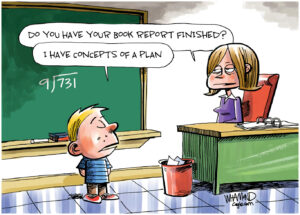Thom Hartmann: American Democracy Is on the Brink
Republicans are using voter suppression to maintain their grip on power. If we don't act now, we'll forfeit what's left of our freedoms. Thomas Jefferson was preoccupied with the capacity of the rich to "prey" upon the poor. (Metal Chris / Flickr)
Thomas Jefferson was preoccupied with the capacity of the rich to "prey" upon the poor. (Metal Chris / Flickr)
The Republican Party is currently hoping to win nationwide using two simple elements: explicit and overt racism, and voter suppression.
No “ideas”; no pitch for tax cuts; no discussion of their “replacement” for the Affordable Care Act; no push for better schools, hospitals, airports, roads or bridges; no promise for more and better jobs—none of these staples of the 2016 presidential campaign can be found in pretty much any Republican advertising today.
Instead, the public Republican message is all about race or the subset of race, religion (“Muslim” stands in for “brown Arab” in GOP-speak) and “immigration” (aka brown people from south of our border). Republicans across the country are even recruiting white supremacist and neo-Nazi gangs to threaten or assault Democrats and their supporters, while President Donald Trump praises the criminal assault of reporters in the wake of jurnalist Jamal Khashoggi’s murder.
Meanwhile, Republican secretaries of state across the nation are vigorously purging voters from the rolls (over 14 million, more than 10 percent of America’s active voters, in the past two years, according to investigative reporter Greg Palast).
Immediately after the five Republican appointees on the U.S. Supreme Court gutted the Voting Rights Act in 2013, 14 GOP-controlled states moved, within a year (some within days), to restrict access to the vote, particularly for communities of color, students, and retired people.
In North Carolina, for example, 158 polling places were permanently closed in the 40 counties with the most African American voters just before the 2016 election, leading to a 16 percent decline in African American early voting in that state. An MIT study found that, nationwide, Hispanic voters wait 150 percent longer in line than white voters, and Black voters can expect to wait 200 percent longer in line to vote.
In Indiana, then-Governor Pence’s new rigorous voter ID law caused an 11.5 percent drop in African American voting. Students are suing for their right to vote, and retired people who no longer drive but care passionately about their Social Security and Medicare are being turned away at the polls by the tens of thousands.
How did it come to this?
The problem for the GOP has deep roots. In the 1870s, when the Party abandoned its Lincolnesque position in favor of granting full citizenship rights to freed slaves, it rapidly slid into the role of being the party of the barons of rail, oil, coal, steel, and construction.
The Democratic Party, meanwhile, largely threw its efforts—culminating in the New Deal in 1933 and the Great Society in 1967—in with working people, legislatively protecting unionization efforts, passing Social Security and Medicare, putting the minimum wage and unemployment insurance into law, and creating federal and state agencies to protect workers’ safety, children, and the environment.
This has led to a major problem for the GOP, since the very wealthy and CEOs only constitute a small part of the American voting public. In order to pass tax cuts and cut protective regulations for their rich owners, they needed political power, and—particularly since the disastrous “roaring 20s” leading straight to the Republican Great Depression (yes, they called it that until after WWII)—Republicans needed voters to put them into office.
And this was generally pretty tough for the GOP. In 1974, for example, the GOP only had outright control of seven states. The message of, “elect us and we’ll help the rich people out” just didn’t generally resonate with American voters. It’s the reason why, outside of the fluke elections of 1946 and 1952, Democrats outright controlled the House of Representatives for three generations, from 1933 to 1996, and controlled the Senate for most of that time.
Desperate to win the presidency in 1968, Richard Nixon even went so far as to commit treason by torpedoing a peace deal that LBJ had worked out with the Vietnamese. According to the then-president of Iran, Reagan did the same thing by cutting a deal with Iran to hold the U.S. embassy hostages until after the election, destroying Jimmy Carter’s chances of re-election.
In 2000, though, the GOP changed tactics. After President Ronald Reagan almost got busted for Iran/Contra (he testified that he “forgot” about details of the program over 80 times; he was saved by his growing Alzheimer’s from an indictment), they realized that getting busted for treason wasn’t worth the risk. They needed a “Plan B.”
And it was deliciously simple. If the majority of voters don’t like what you’re selling, then just don’t let them vote.
Paul Weyrich had promoted this idea back in 1980 when he was campaigning for Reagan (after co-founding the Heritage Foundation), and, indeed, many Republican luminaries (like William Rehnquist, who went from poll-intimidator in the 1960s to Chief Justice of the Supreme Court) rose up through the ranks by participating in Republican-run voter intimidation schemes.
But it became the foundational go-to tactic for the GOP in 2000.
While they used smear and innuendo to attack Al Gore (ridiculing him for helping write the legislation that created the modern internet, for example), the main thing that got George W. Bush into the White House was voter suppression crimes committed by his brother, then-Florida Gov. Jeb Bush, and Bush’s Secretary of State, Katherine Harris. Throwing somewhere between 50,000 and 90,000 African American voters off the rolls, they were able to get the vote close enough that five Republican appointees to the Supreme Court functionally awarded Bush the presidency. (The BBC covered this in 2001 in two major investigative reports here and here that were literally seen all over the world except on any American media.)
By 2016, the Republican Party had fine-tuned their voter suppression and intimidation systems to the point that they ran in nearly 30 states like well-oiled machines. Between the 2012 and 2016 presidential elections, for example, Ohio had purged more than 2 million voters from its rolls, the vast majority (more than 2:1) in heavily African American and Hispanic counties. (And the Supreme Court ruled last year that they can keep it up; other states have since adopted their new tactic of caging voters.)
The New York Times noted that in Wisconsin, around 300,000 registered voters were turned away at the polls because they didn’t have the particular types of ID necessitated by Scott Walker’s ALEC-recommended new voter ID law (in Texas, the Times reported, the number was 900,000).
It’s symbiotic: billionaires and corporations spend hundreds of millions to fund Republicans, who pass laws and tax breaks that give billions to the corporations and billionaires, who then recycle a fraction of that, mere millions, back to the legislators they own. To keep the cycle going, both must prevent people who object to this system from voting.
ALEC (the American Legislative Exchange Council), funded by the Koch network and other billionaires and big corporations, has been at the forefront of these efforts, with the majority of voter suppressive state laws passed having been introduced by ALEC-affiliated Republican legislators. ALEC itself facilitated the production of voter suppressive “model legislation.”
Average American voters generally don’t like billionaires and corporations running politics, so the billionaires and their corporations have organized major efforts to keep those people from voting. Numbers are sketchy, because Republican Secretaries of State are unwilling to release purge numbers and details without being sued to do so.
Fortunately for America, investigative reporter Greg Palast is executing such lawsuits right now, and the purge lists he’s acquired in the past two weeks include over 90,000 people in largely Democratic parts of Nevada, 769,436 voters purged in Colorado, 340,134 in Georgia, 550,000 in Illinois, a large but as-yet-uncounted list from Nebraska, and 469,000 just purged in Indiana. More are coming in virtually daily, as Palast continues his lawsuits, along with the NAACP and Rainbow Push.
True the Vote, the latest Astroturf group pushing for voter purges, is partly funded by the Judicial Crisis Network (JCN), the group that spent millions to run nationwide TV ads for Judge Brett Kavanaugh disparaging Dr. Christine Blasey Ford’s testimony as a “sham.”
Without these major voter purges, and without the disenfranchisement of young people, old people, and poor people by voter ID laws, it’s a virtual certainty that America would have had President Al Gore and President Hillary Clinton, and the Democratic Party would have a 7-3 or larger Democratic majority on the U.S. Supreme Court.
JCN, in turn, is funded by the Wellspring Committee that, according to investigative reporter Ken Vogel, was started by billionaires Charles and David Koch. (Their father, Fred Koch, was a founder and major funder of the John Birch Society, which ran “Impeach [Supreme Court Chief Justice] Earl Warren” billboards and ads across America in the 1950s and 1960s decrying the Supreme Court’s 1954 desegregation order in Brown v. Board, and funded publications and efforts characterizing the voter drives of Martin Luther King Jr. as a communist plot.)
Without these major voter purges, and without the disenfranchisement of young people, old people, and poor people by voter ID laws, it’s a virtual certainty that America would have had President Al Gore and President Hillary Clinton, and the Democratic Party would have a 7-3 or larger Democratic majority on the U.S. Supreme Court.
Republicans, instead of helping working people, love to lecture Americans that only their elected officials and Federal and Supreme Court justices are actually channeling the “original intent” of the founders and framers of the Constitution. (“Originalism” is a scam run uniquely by Republican justices, for example.)
Like their rigged elections and their ads saying that they want to defend Social Security and protect us against insurance companies viz preexisting conditions, it’s a lie.
Although about half of the founders were slaveholders, practicing their own form of voter suppression, they nonetheless held egalitarian values for the future of this country and worried obsessively about a takeover by the very rich. It’s hard to imagine that they’d ever sanction interpreting the First Amendment as a license for billionaires and corporations to buy our political system (as the Supreme Court first did in 1976 in the Buckley case, and then supercharged in 2010 with Citizens United).
In the summer of 1785, James Madison was essentially running the Constitutional Convention in Philadelphia, and he gave a speech (you can read in his Notes on the Convention) about the importance of not allowing the new country they were forming to become an oligarchy, run of, by, and for the rich. He noted that there are “two cardinal objects of government, the rights of persons and the rights of property.”
He added that if only the rights of property were written into the Constitution, the rich would ravage the few assets of the poor. “Give all power to property,” he said, “and the indigent will be oppressed.”
In fact, Madison noted, all the former republics that they had studied in his five years of preparation for writing our Constitution had ended up corrupted by exactly that: the political power of concentrated money.
“In all the governments which were considered as beacons to republican patriots and lawgivers,” he said, “the rights of persons were subjected to those of property. The poor were sacrificed to the rich.”
Thus, wanting to establish a country where the rich didn’t end up running it as their own private kingdom or oligarchy, he proposed that only the House of Representatives—the only branch elected directly by the people, and every two years at that—should have the power to raise taxes or spend federal funds.
“The time to guard against this danger is at the first forming of the Constitution,” he said in his speech. “Liberty, not less than justice, pleads for the policy here recommended.
“If all power be suffered to slide into hands [of the rich]” he warned, the American citizenry will “become the dupes and instruments of ambition, or their poverty and dependence will render them the mercenary instruments of wealth. In either case liberty will be subverted: in the first, by a despotism growing out of anarchy; in the second, by an oligarchy founded on corruption.”
And, indeed, the delegates assembled agreed. Only the House of Representatives, to this day, can raise taxes or spend money.
In a 1787 letter to Edward Carrington, Thomas Jefferson noted, “It seems to be the law of our general nature, in spite of individual exceptions; and experience declares that man is the only animal which devours his own kind; for I can apply no milder term to the governments of Europe, and to the general prey of the rich on the poor.”
Fighting those instincts of human nature, he argued, was at the core of the American experiment. (Like George Washington and many of his peers, Jefferson died broke. America’s first millionaire came along in 1791—a shipping magnate—and none of the founders or framers were wealthy enough to leave an estate that lasted even to a second generation.)
If we fail to do something large, substantial and dramatic about the scourge of voter suppression, we must all begin learning how to rivet chains.
In an 1816 letter to Samuel Kercheval, Jefferson explained, “I am not among those who fear the people. They, and not the rich, are our dependance (sic) for continued freedom.”
He added that if we ended up with an oligarchic government that is run, directly or indirectly, by the rich, America’s working people “must come to labor sixteen hours in the twenty-four;… and the sixteenth being insufficient to afford us bread, we must live, as they [poor Europeans] now do, on oatmeal and potatoes; have no time to think, no means of calling the mismanagers to account; but be glad to obtain subsistence by hiring ourselves to rivet their chains on the necks of our fellow sufferers.”
One wonders how the employees of the giant corporations that throw so much money at the Republican Party would compare that metaphor with their own current existence, since the GOP has successfully fought any meaningful reform of union rights, universal health care, or the minimum wage since Reagan.
And they’re using voting suppression to maintain a situation that’s so hostile to workers that wages have actually fallen for the bottom half of American workers in the 38 years since Reagan’s election in 1980.
Thomas Paine, in his 1795 Dissertation on First Principles of Government, noted that, “The right of voting for representatives is the primary right by which other rights are protected. To take away this right is to reduce a man to slavery, for slavery consists in being subject to the will of another, and he that has not a vote in the election of representatives is in this case.”
If we fail to do something large, substantial and dramatic about the scourge of voter suppression, we must all begin learning how to rivet chains.
Those are our options.
This article was produced by the Independent Media Institute.
As we navigate an uncertain 2025, with a new administration questioning press freedoms, the risks are clear: our ability to report freely is under threat.
Your tax-deductible donation enables us to dig deeper, delivering fearless investigative reporting and analysis that exposes the reality beneath the headlines — without compromise.
Now is the time to take action. Stand with our courageous journalists. Donate today to protect a free press, uphold democracy and uncover the stories that need to be told.







You need to be a supporter to comment.
There are currently no responses to this article.
Be the first to respond.